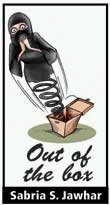Sabria S. Jawhar
ALLEGED violations and abuse of authority by some members of the Commission for the Promotion of Virtue and Prevention of Vice are making headlines in Saudi Arabia these days.
Even as readers drew their breath on learning about the death of a young man in the Commission’s center in Riyadh came news of another such death in Tabuk and pictures of a student who, according to his father, was beaten up by Commission members in Najran – all within a period of just 10 days.
Last week, though, as murder investigations got underway against some Commission members on the charge of forced entry into a house and beating to death of a Saudi citizen, Commission officials appealed to the public not to jump to conclusions and asked the media to be fair and balanced in their coverage. Yet, some of them fell into the very same trap they were warning against by defending their colleagues even before the result of the investigation came out.
Media focus on the ways of some the Commission members came almost at the same time as the release of a report by the Saudi National Human Rights Association (NHRA) on the human rights situation in the Kingdom. The report highlights the importance of reviewing the authority given to the Commission since it sees some overlap with the authority given to other government’s establishments. Nevertheless, we are not here to criticize or evaluate the Commission’s authority as this should be left to specialists and based on facts and numbers.
Our discussion here will be limited to the reasons behind the recent rise of violence in Saudi society from the domestic level to a schools, prisons and now the very Commission that is supposed to be guarding the door of Islamic teaching.
Violence between some members of the Commission and citizens is not something new. The media has been reporting such cases of violence but none of them has reached the level of death in custody.
In the days ahead, we will know whether the Commission members are guilty or innocent. The question that will remain though is, what led the advocates of religion to violence in their own establishment? Aren’t they supposed to be advising people in a manner as to attract them to the religion? Aren’t they trained enough to deal with violence and avoid it when it uncontrollably erupts? What about those so-called freelancers? Are they trained enough to be able to verify the truth and make sure that a suspected vice is indeed taking place before reporting it to the Commission’s center?
Last year, the Saudi leadership issued a decree announced by Prince Naif Bin Abdul Aziz, Minister of Interior, that said suspects apprehended by the Commission must be handed over to the regular police for questioning and subsequent trial in a court of law – Islamic law.
The decree underlined that last point on jurisdiction, saying the Commission’s role will end with the arrest. Another decree was also issued that prohibits the Commission members from using cars other than the official ones with the logo.
Based on these facts, is the hiring of freelancers a legal act? What are the limitations of their authority? Isn’t it a sort of interference in people’s private life? What is Islam’s point of view concerning spying by freelancers posing as ordinary citizens like you and me?
Have we got so familiar with the daily scenes of blood and violence in the media that we have become immune to them? Does alcohol trading or any other morality crime justify an act of cruelty or human rights violation?
These questions are not aimed at undermining the Commission’s role or doubting the good intention of its members. It is just a call for a national strategic plan to fighting increasing violence in our society and to establish social studies centers to research into not only this disturbing phenomenon but also the ideal actions that should be taken to establish a healthy and strong relationship between the religious establishments and the community. This relationship should be based on mutual respect, not fear and intimidation.
I believe that the time has come to revise the way religion is used in our government and non-government establishments. The use of religion for interference and imposing guardianship on people should be immediately and officially stopped before things get out of control. Religion is a holy relationship between a person and his God. It should not be imposed by force.
Monday, June 11, 2007
Subscribe to:
Post Comments (Atom)


No comments:
Post a Comment